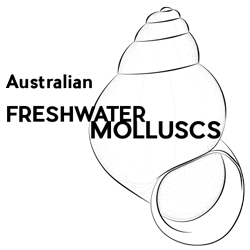
Species of the B. hullii group are found in the northern half of Tasmania. Their shells are small (1.7-3.7 mm in length; most less than 3.5 mm), simple, ovate-conic to broadly conic, with a thin inner lip and no columellar bulge. The periphery of the last whorl of the shell is rounded, subangled or angled and the penis simple.
This species differs from other members of this group in a mantle cavity with fewer ctenidial filaments (14-16); radula with U-shaped median cusps on central and lateral radular teeth; female genital system with single bend in proximal coiled oviduct which extends posterior to bursa copulatrix.
Beddomeia bowryensis Ponder & Clark, 1993
Class Gastropoda
Infraclass Caenogastropoda
Order Littorinida
Suborder Rissoidina
Superfamily Truncatelloidea
Family Beddomeiidae
Original name: Beddomeia bowryensis Ponder & Clark, 1993. In Ponder, W.F., Clark, G.A., Miller, A.C. & Toluzzi, A. (1993). On a major radiation of freshwater snails in Tasmania and eastern Victoria: a preliminary overview of the Beddomeia group (Mollusca: Gastropoda: Hydrobiidae). Invertebrate Taxonomy 7: 501-750.
Type locality: Bowry Creek, tributary of Savage River, side road, off Corinna Road, Tasmania.
This species is mostly found on aquatic vegetation. Egg capsules presumably like those of other species of Beddomeia - dome-shaped, with broad attachment base, covered with minute, mainly white sand grains and other fragments and containing a single egg. Development direct.
Known from Bowry Creek, Tasmania.
All species of Beddomeia are geographically isolated and have restricted ranges.
This species is on the Tasmanian Threatened Species Protection Act 1995 as Rare (small population at risk).
Ponder, W. F., Clark, G. A., Miller, A. C. & Toluzzi, A. (1993). On a major radiation of freshwater snails in Tasmania and eastern Victoria: a preliminary overview of the Beddomeia group (Mollusca: Gastropoda: Hydrobiidae). Invertebrate Taxonomy 7: 501-750.